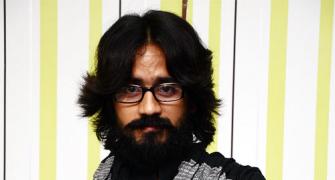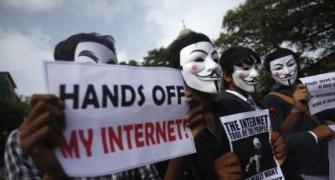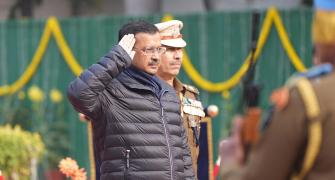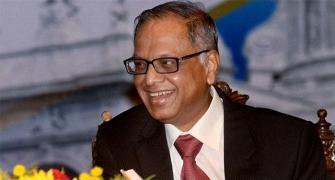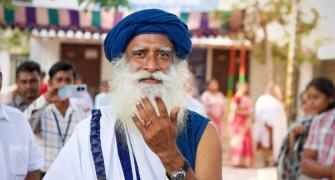
By striking down Section 66A of the IT Act, the Supreme Court has ruled against the arrogance and impertinence of power, says Paranjoy Guha Thakurta.
The Supreme Court of India's decision to scrap Section 66A of the Information Technology Act of 2000 came not a day too soon.
The apex court's order not only signifies a big victory for those who have struggled to uphold the right to free expression, which is a fundamental right of every Indian citizen, it has restrained government authorities -- notably the police -- from acting in an arrogant and arbitrary manner against anyone and everyone who 'offends', or does not subscribe to the views of, those in power, including politicians, bureaucrats and corporate captains.
The right to free expression is not an absolute one. No right is. Article 19(2) of the Constitution of India circumscribes the right to free expression outlined in Article 19(1)(a) by what are described as 'reasonable' restrictions.
This is what is stated in Article 19(1)(a) in the Constitution of India, 1949: 'All citizens shall have the right:
a. to freedom of speech and expression;
b. to assemble peaceably and without arms;
c. to form associations or unions;
d. to move freely throughout the territory of India;
e. to reside and settle in any part of the territory of India...
Article 19(2) adds: '... nothing in sub clause (a) of clause (1) shall affect the operation of any existing law, or prevent the State from making any law, in so far as such law imposes reasonable restrictions on the exercise of right conferred by the said sub clause in the interests of sovereignty and integrity of India, the security of the State, friendly relations with foreign states, public order, decency or morality or in relation to contempt of court, defamation or incitement to an offence.'
The contentious question has been: Who decides what is 'reasonable' or what is not?
Is it your neighbour who doesn't like your face, a local gangster, a politician, a junior policeman, a top cop, a religious fundamentalist, a judge of a lower court or a bench of judges of the Supreme Court?
The problem in India has been that too many people have been more than willing to take the law into their own hands and even act as a moral cop.
Another limitation in Article 19(2) is that while disruption to 'public order' is clearly not allowed, the issue of 'public interest' is not dealt with in enforcing the fundamental right to free expression. This was stated to this writer by eminent jurist Fali Nariman, who happens to be the father of Supreme Court Judge Rohinton F Nariman who wrote the judgment scrapping Section 66A.
'Reason has always existed, but not always in a reasonable form,' German political philosopher Karl Marx remarked in a letter to his friend Arnold Ruge in 1843. This is precisely the point. What the Supreme Court has done is to restore some 'reasonableness' to the public discourse on freedom of expression.
There were too many words in Section 66A which were vague and had not been defined properly, words like 'annoyance' and 'menacing,' which allowed governments to take recourse to muzzling inconvenient views in the guise of ensuring 'public order.' This urge has been shared by people in power across the political spectrum, from the Congress to the Bharatiya Janta Party as well as regional parties like the Trinamool Congress.
Thus, Section 66A came to epitomise and embody the blatant exploitation of the vagueness in terminology for discouraging and, if necessary, punishing those who expressed views which the government of the day considered unacceptable as measured by their own yardstick of 'reasonableness.'
Ironically, governments were using these penal provisions to rein in opinions and freedom in cyberspace which has evolved as one of the most potent achievements of humankind for facilitating free flow of ideas and opinions.
What did Section 66A of the Information Technology Act of 2000 (as amended in 2008 and which received Presidential assent in February 2009) say? 'Any person who sends, by means of a computer resource or a communication device:
a. any information that is grossly offensive or has menacing character; or
b. any information which he knows to be false, but for the purpose of causing annoyance, inconvenience, danger, obstruction, insult, injury, criminal intimidation, enmity, hatred or ill will, persistently by making use of such computer resource or a communication device;
c. any electronic mail or electronic mail message for the purpose of causing annoyance or inconvenience or to deceive or to mislead the addressee or recipient about the origin of such messages, shall be punishable with imprisonment for a term which may extend to three years and with fine.
Section 66A provided punishment for sending offensive messages through communication services. These messages may be any information created, transmitted or received on a computer system, resource or device including attachments in the form of:
• text
• images
• audio
• video
• any other electronic record which may be transmitted with the message.
The section sought to target messages that
• are grossly offensive or menacing;
• proffer false information intending to cause annoyance, inconvenience, intimidation, insult, obstruction, etc, and
• are intended at deceiving the addressee about the origin of the message
Among the most glaring instances of the arbitrary manner in which Section 66A has been misused was on Shaheen Dhada and Rinu Srinivasan of Palghar near Mumbai.
After the death of Shiv Sena supremo Balasaheb Thackeray in 2012, Shaheen posted the following message on Facebook: 'Every day thousands of people die. But still the world moves on... Just due to one politician dead (sic). A natural death. Everyone goes crazy... Respect is earned not given out, definitely not forced. Today Mumbai shuts down due to fear not due to respect.'
Rinu, who 'liked' the post, commented: Everyone know it's done because of fear!!! We agree that he has done a lot of good things (sic). Also we respect him, it doesn't make sense to shut down everything! Respect can be shown in many other ways!'
The two young women were detained by the police, first charged under the Indian Penal Code for allegedly spreading hatred and then under Section 66A of the IT Act.
Shreya Singhal, a 24-year-old Delhi-based law student, was the first to challenge the section after Dhada and Srinivasan's arrest.
A fifth generation lawyer in her family, Singhal has today become a celebrity of sorts after the Supreme Court judgment.
Ambikesh Mahapatra, a Kolkata-based Jadavpur University professor of chemistry, and his neighbour Subrata Sengupta were arrested for circulating a cartoon that mocked West Bengal Chief Minister Mamata Banerjee.
The cartoon, based on a scene from Satyajit Ray's film Sonar Kella, depicted Banerjee pointing her finger at the logo of the Indian Railways and telling her party compatriot Mukul Roy: 'See Mukul, Sonar Kella.'
In the cartoon collage, Roy points to the then Union railways minister Dinesh Trivedi (all members of the Trinamool Congress) and exclaims in Bengali: 'That’s an evil man!!!' Mamata orders: 'Evil man, vanish!'
For the 'crime' of circulating this cartoon by e-mail, Mahapatra was not only beaten up by goons owing allegiance to the Trinamool Congress, but had to spend time behind bars. The Kolkata high court recently ordered that he be paid a compensation of Rs 50,000.
A Class 11 student of Bareilly, Uttar Pradesh, was arrested by the Rampur police in March 2015 after he allegedly posted a Facebook comment that was attributed to powerful state minister Azam Khan. The post quotes Khan as having made a communal comment. The teenagerb was jailed under Section 66A as well as the Indian Penal Code for promoting enmity and inciting communal tension. Later, he was released under bail.
In June 2014, eleven students of the Sree Krishna College, Thrissur, Kerala, as well as their principal, were accused of violating Section 66A and nine of them were arrested. The students were accused of using ;objectionable and unsavoury' language against Prime Minister Narendra Modi in an online magazine in the form of a clue to a crossword puzzle.
The clue apparently used Modi's nickname NaMo as the crossword clue for which the purported solution was an invective.
Interestingly, the students were also accused of defaming Kerala Chief Minister Oommen Chandy, Congress Vice-President Rahul Gandhi and MP Shashi Tharoor, as well as spiritual leader Mata Amrithanandamayi. The students, who belonged to the Students Federation of India affiliated to the Communist Party of India-Marxist, alleged that complaints against them were lodged by their political opponents.
In October 2012, Ravi Srinivasan, owner of a small plastic goods manufacturing unit in Puducherry, put up a post on Twitter saying that then finance minister P Chidambaram's son Karti had amassed more wealth than Robert Vadra.
The police arrested him from his home at 5 am a day after he posted his Tweet. At that time, he only had 16 followers on Twitter, but the number jumped to more than 2,000 in little or no time.
The Information Technology Act was legislated by the Congress-led United Progressive Alliance government. At that time, the BJP was in the Opposition and attacked it. Modi went so far as to change his display photograph on Twitter to express his solidarity with those who were protesting against the law.
Once elected, his government did an about turn and assured the Supreme Court that there was no need to change the law and that it would be effectively implemented.
Explaining why the BJP-led National Democratic Alliance government was less than enthusiastic about doing away with what for many felt was a draconian law, journalist Mihir Sharma argued in Business Standard: 'For this government's true opinion of the Internet-related idiocies of the last government, no better indicator exists than the fate of Gulshan Rai.'
'Dr Rai, a Delhi bureaucrat, is the man more than any other in charge of various acts of blocking and censorship under the last regime. In fact, Vakul Sharma, a Supreme Court lawyer on the expert committee that drafted the controversial 2008 amendments to the IT Act, has called Dr Rai "the father of the IT Act".'
'Has the new government sacked Dr Rai? No. It has promoted him -- to a newly formed position, created especially for him. Narendra Modi, who blacked out his display photograph in response to Dr Rai's blocks, has brought the same Dr Rai into his PMO as India's first cyber-security czar, with a Rs 1,000 crore (Rs 10 billion) budget.'
'Given this attitude of the government, the courts have to reassert a role long forgotten: As the guardians of our liberal rights against State action.'
The BJP government's legal position on Section 66A, as was argued in the Supreme Court, was no different from the position taken by then communications and information technology minister in the UPA government, Kapil Sibal.
So, what were the grounds on which the apex court struck down Section 66A?
Calling it 'open-ended and unconstitutionally vague,' the bench of Justices J Chelameswar and Rohinton Nariman said nothing short of quashing the law 'in its entirety' could suffice since Section 66A 'arbitrarily, excessively and disproportionately' invaded the right to free speech, right to dissent, right to know, and had a 'chilling effect' on Constitutional mandates.
'As Section 66A severely curtails information that may be sent on the Internet based on whether it is grossly offensive, annoying, inconvenient, etc, and being unrelated to any of the subject matters under Article 19(2) must, therefore, fall foul of Article 19(1)(a), and is declared as unconstitutional and void,' the bench ruled.
Among the key points made by the court while striking down the Section66 A was that the section had been widely misused by the police in various states to arrest innocent persons for posting critical comments about social and political issues and about political leaders on social networking sites.
Terming liberty of thought and expression as 'cardinal,' the bench added: 'The public's right to know is directly affected by Section 66A of the Information Technology Act.'
The court, however, allowed the government to block Web sites if their contents had the potential to create communal disturbance, social disorder or affect India's relationship with other countries.
'How is it possible for a law enforcement agency and others to decide as to what is offensive and what is grossly offensive? What may be offensive to a person may not be offensive to the other?' the bench asked.
The court said terms like 'annoying,' 'inconvenient' and 'grossly offensive,' used in the provision are vague as it is difficult for the law enforcement agency and the offender to know the ingredients of the offence.
The bench also referred to two judgments of separate British courts which reached different conclusions as to whether the material in question was offensive or grossly offensive.
The Supreme Court of India has, once again, done the citizens of the world's largest democracy proud. It has ruled against the arrogance and impertinence of power.
With research assistance by Anand Vardhan.
Image: Protests against Section 66A during the UPA government. Photograph: Reuters.

